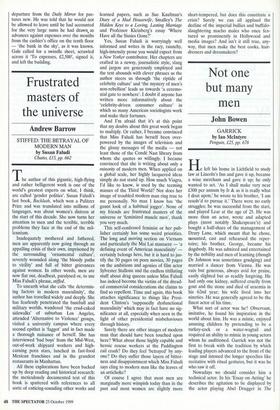Frustrated masters of the universe
Andrew Barrow
STIFFED: THE BETRAYAL OF MODERN MAN by Susan Faludi Chatto, £15, pp. 662
The author of this gigantic, high-flying and rather belligerent work is one of the world's greatest experts on what, I think, are called 'gender politics'. Susan Faludi's last book, Backlash, which won a Pulitzer Prize and was translated into millions of languages, was about women's distress at the start of this decade. She now turns her attention to men and the terrible, terrible problems they face at the end of the mil- lennium.
Inadequately mothered and fathered, men are apparently now going through an appalling crisis of their own, imprisoned by the surrounding 'ornamental culture', severely wounded along 'the bloody paths to virility' and full of bitter grievances against women. In other words, men are now flat out, deadbeat, paralysed or, to use Miss Faludi's phrase, stiffed.
To unearth what she calls 'the determin- ing factors in modem masculinity', the author has travelled widely and deeply. She has fearlessly penetrated the baseball and military worlds, wandered 'the crud-caked sidewalks' of suburban Los Angeles, attended 'Alternative to Violence' groups, visited a university campus where every second epithet is 'faggot' and in fact made a thorough nuisance of herself. She has interviewed 'bad boys' from the Mid-West, out-of-work shipyard workers and high- earning porn stars, lunched in fast-food Mexican franchises and in the grandest restaurants in Manhattan.
All these explorations have been backed up by deep reading and historical research: the meticulously documented text of this book is spattered with references to all sorts of enticing-sounding other works and
learned papers, such as Sue Kaufman's Diary of a Mad Housewife, Smalley's The Hidden Keys to a Loving, Lasting Marriage and Professor Kleinberg's essay 'Where Have all the Sissies Gone?'
Yes, Susan Faludi is worryingly well informed and writes in the racy, raunchy, high-intensity prose you would expect from a New Yorker contributor. Her chapters are crafted in a newsy, journalistic style, slang and jargon are generously employed and the text abounds with clever phrases as the
author steers us through 'the riptide of celebrity culture' and 'the mystery of men's non-rebellion' leads us towards 'a ceremo- nial gate to nowhere'. I doubt if anyone has written more informatively about the 'celebrity-driven consumer culture' in which so many American sociologists work and make their fortunes.
And I'm afraid that it's at this point that my doubts about this great work began to multiply. Or rather, I became convinced that Miss Faludi has herself been over- powered by the images of television and the glossy messages of the media — not
least those of the Conde Nast library from whom she quotes so willingly. I became
convinced that she is writing about only a
minority of modem men. When applied on a global scale, her highly lacquered ideas
simply do not stand up. How much Viagra, I'd like to know, is used by the teeming masses of the Third World? Nor does her image of troubled modern man ring true to me personally. No man I know has 'the gaunt look of a habitual jogger'. None of my friends are frustrated masters of the universe or 'feminized muscle men', thank you very much.
This self-confessed feminist or her pub- lisher certainly has some weird priorities.
The long and moving section on Vietnam and particularly the Mai Lai massacre — 'a defining event of American masculinity' - certainly belongs here, but it is hard to jus- tify the 50 pages on porn movies, 30 pages on the ambitions and agonies of film actor Sylvester Stallone and the endless titillating stuff about drag queens unless Miss Faludi has indeed become the victim of the dread- ed commercial considerations she claims to find so repellent. Time and again, this book attaches significance to things like Presi- dent Clinton's 'supposedly dysfunctional masculinity' which may in fact have no sig- nificance at all, especially when seen in the light of other presidential misbehaviours through history.
Surely there are other images of modern man that should have been touched upon here? What about those highly capable and heroic rescue workers at the Paddington rail crash? Do they feel 'betrayed' by any- one? Do they suffer those layers of bitter- ness and disappointment which Miss Faludi says cling to modern man like the leaves of an artichoke?
Of course I agree that most men are marginally more wimpish today than in the past and most women are slightly more short-tempered, but does this constitute a crisis? Surely we can all applaud the decline of the imperial bullies and buffalo- slaughtering macho males who once fea- tured so prominently in Hollywood and media images? And isn't it still true, any- way, that men make the best cooks, hair- dressers and dressmakers?


















































































 Previous page
Previous page